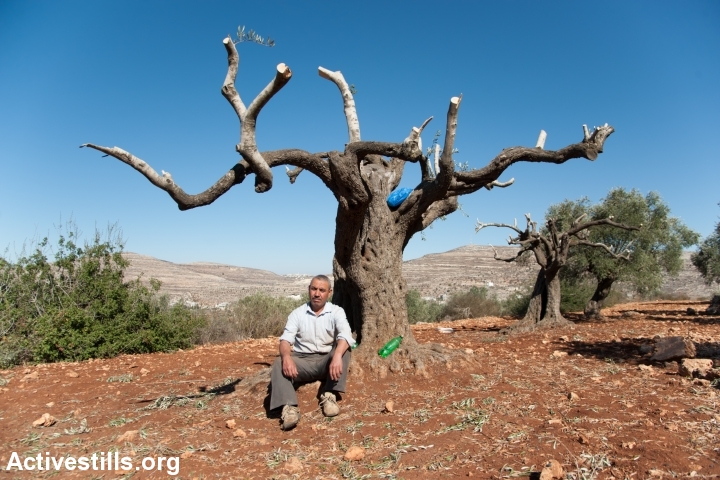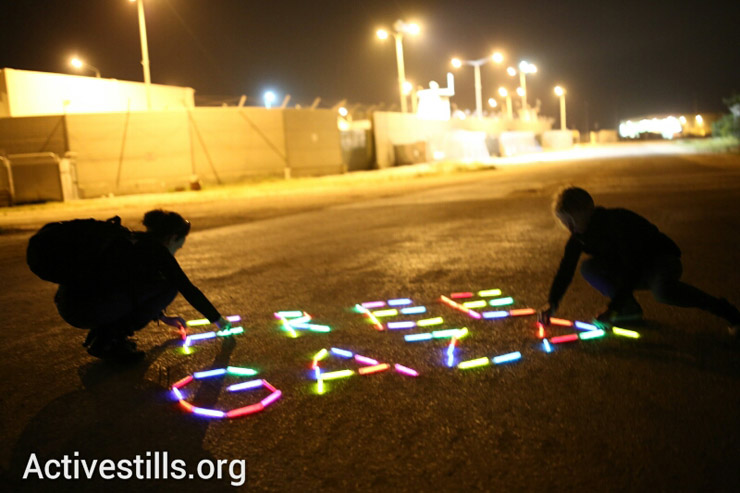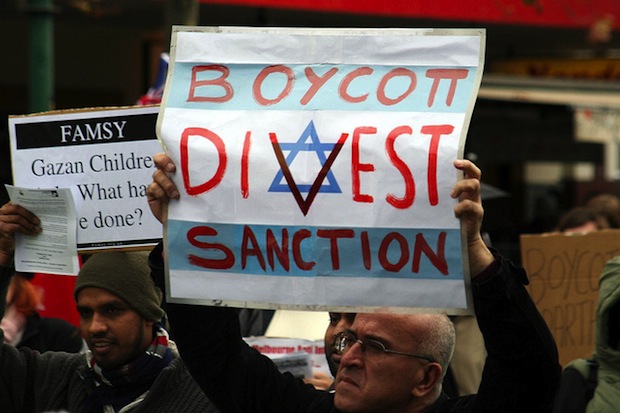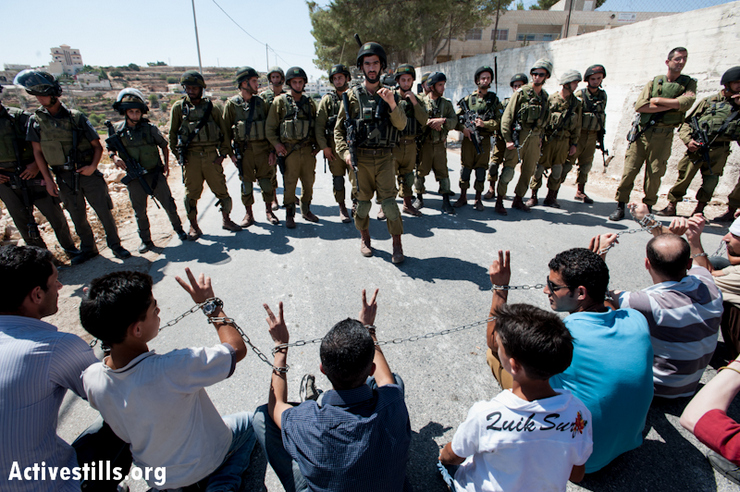Those who care about ending the occupation, in Israel and outside it, are faced with real, difficult choices. I believe these choices matter. That is why I oppose BDS.
Larry Derfner’s recent article in support of BDS is well-written, passionately argued and compelling. Nonetheless, I find myself in strong disagreement with its key assertions and conclusions.
As I see it, the article rests on the following argument: first, the evacuation of settlements necessary to end the occupation would be very difficult for Israel. Second, Israelis do not currently incur any significant cost for the continuation of the occupation. Third, the only way to make Israelis pay that cost is by supporting some version of boycott, divestment and sanctions (BDS), at least on the settlements themselves.
I find all three statements unconvincing, and will address each in turn.
The settlers are paper tigers
Larry rightly points out that it is impossible to envisage an end to the occupation without extensive settlement evacuation. But I believe he errs when stating that the “specter of the sort of cataclysm that would be triggered [if there is major settlement evacuation] is enough to stop any government from touching it.” Why would there be such a cataclysm? Because the ideological core of the settlers are “fearsome,” they (and the right) would engage in “rebellion” which could lead to “bloodshed” and turn the country “upside down.”
Read: After Kerry, only BDS may save the two-state solution
Will resistance be so fierce and costly? Larry points to past experience with evacuations, in the Sinai and Gaza Strip (he doesn’t mention that a handful of small settlements in the West Bank were also removed as part of the Gaza disengagement plan). These evacuations affected a relatively moderate branch of the settlement movement, a small number of people, and areas that were (largely) outside the scope of the “Greater Israel” project and of lower ideological valence. Yet they were accompanied by significant upheaval, protest and turmoil, including some (non-lethal) violence.
It makes sense to conclude that evacuating a much larger mass of far more extreme settlers from the areas perceived as most valuable and sacred would indeed be “cataclysmic.” But such a scenario would go against everything we have learned about the ideological settlers and the extreme right since the occupation began, and possibly before it.

According to figures collected by B’Tselem, 169 Palestinians were killed by Israeli civilians over the past quarter century. Considering that there are several hundreds of thousands of Israeli civilians, many of them armed military veterans, living amidst millions of Palestinians, this is a very low figure. And, if anything, it grossly overestimates the Israeli right’s capacity to wield lethal violence. It includes, for example, all killings of Palestinians by civilian patrols and security guards, many of which may have nothing to do with right-wing ideology (which is not to say that they were all, or mostly, justified).
Furthermore, to the best of my knowledge, during this period of time, there was just one killing of a Jewish Israeli by Jewish right-wingers on ideological grounds: the assassination of Prime Minister Yitzhak Rabin by Yigal Amir in 1995, following the signing and implementation of the Oslo Accords with the Palestinians. This was arguably a highly effective act of intra-Jewish political violence, which is nonetheless the exception.
A mass settlement evacuation could be different. But if we examine the violence that the Jewish right does employ on a large scale, I believe it is very revealing of their level of resolve during a true crisis. Largely, the most characteristic acts of right-wing violence are those that have recently been labled as “price tag attacks,” but are much older than this moniker. These are crimes such as arson, vandalism, threats, assault, stone throwing and dispersed gunfire. Let there be no doubt – this is real violence, dangerous and harmful. It causes the Palestinians genuine, large scale suffering, including dispossession from their lands.

Yet these acts of violence are also the acts of cowards. There have been a few right-wing fanatics who were willing to sacrifice their lives in the pursuit of their evil cause, including Eden Natan-Zada, Baruch Goldstein and Yigal Amir (even among them, only the last was willing to brave similarly armed men). Far more typical are the settlers who send their underage children to attack Palestinians, knowing that they cannot be legally punished. Or those who focus their attacks on the elderly and children.
No one can know for sure what will be the reaction to a mass evacuation of settlements, but the right wing’s record shows it is unlikely to be cataclysm-inducing. Extremely noisy and self-righteous? Of course. Accompanied by many cowardly acts of genuinely ugly and harmful, yet largely non-lethal, acts of violence against the most vulnerable Palestinians? Most probably. Some acts of non-lethal violent resistance to Israeli security forces? Quite likely. But a massive and bloody insurrection would be a break with all past patterns.
Israelis believe they are paying a price for the occupation
Even if the evacuation of settlements will not be as apocalyptic as Larry envisages, it will certainly come with some significant costs, as far as Israelis are concerned. Some violence will occur, and it will be nasty. It will be a complex and costly endeavor (though nothing in comparison to some of Israel’s past undertakings). And many Jewish Israelis will be sorry to let go of areas to which they feel religiously and historically attached.
But it won’t happen unless Israelis perceive the occupation as harmful to their own interests. Larry clearly thinks they do not. According to him, “Israel isn’t paying any price” for the presence of settlements, and “nobody and nothing of consequence is bearing down on us” to evacuate them. He clearly believes that this is a misguided, myopic view, because he also states that the occupation could lead to Israel’s elimination, and that it should end “for the sake of its [i.e. Israel’s] own basic well-being.”
Are Israelis blind to the damage and risks caused to them by the occupation? This is a question which is very hard to assess. Most people rarely think so analytically of politics. Leaders and elites are more likely to carefully assess the harm and risk of various policies. But on controversial issues, they are careful not to antagonize the broader public, whose thinking on the matter can often be hazy.

Yet if the Israeli public and elites do not see a significant price for the occupation, why is almost no one openly advocating for its continuation? The operative word here is “openly.” Most mainstream Israeli political positions amount to continuing the occupation, but only a handful of marginal figures are willing to admit it out loud. You have the unilateralists of various stripes, the old, faithful two-staters, the autonomists and advocates of the Jordanian option. Even the oddball one-staters are more ubiquitous than the pro-occupation camp.
The fact that so many feel the need to pay lip service to ending the occupation, while having little inclination to act on these statements, is indicative of a broad recognition that the occupation is harmful and risky. Otherwise, why do those who are openly disdainful of international opinions and norms still pretend to offer an alternative, however transparently meaningless?
This was sometime a paradox, but now the time gives it proof
If ending the occupation is not that costly, and continuing it is perceived as harmful and risky, why does it persist? There are a number of reasons. One should not dismiss simple status quo bias. It is much harder to push for change than to maintain inertia, especially when a determined minority is committed to sustaining it, while the majority is much softer in the opposite position. Resentment may also play a part. Jewish Israelis often feel that Palestinians have not “earned” their liberty, and therefore view the occupation as a type of penalty box, where Palestinians should stay until they have atoned for their sins. The idea that an “unjust reward” for Palestinians could nonetheless be helpful to Israel’s own interest is very hard to swallow.
The most potent cause for the occupation’s perseverance may be the fear and demonization of Palestinians in Israeli society. Despite being vastly more powerful, Israelis still tend to worry that their adversaries have a nearly diabolical capacity to harm them. Flying in the face of the country’s entire historical experience, many are convinced that Palestinians (and/or Arabs/Muslims in general) are so consumed by hatred and zealotry that they will destroy themselves if that can also hurt the Jewish state.
How will Jewish Israelis respond to increased support for some forms of boycott, divestment and sanctions, especially if it comes from Jews abroad and the Israeli left? I agree with Larry that the backlash theory – that Israelis will be hardened by outside pressure – is unconvincing, especially in the long term. Where I differ from him is in doubting that any amount of outside pressure can sway Israeli opinion on the occupation itself.
Yet, the question that Larry raises so eloquently cannot be evaded. If not BDS, then what? Current approaches have clearly failed. There is some truth in the tired cliché that the definition of insanity is doing the same thing over and expecting different results. Clearly, we need a different approach. All people who are involved, or who view themselves as stakeholders in Israel or Palestine, have the moral and practical duty to act against the occupation.
My alternative is to focus on changing the situation on the ground. The outside world has little influence on Jewish Israelis’ mindset, and without a change in that mindset (or actual external coercion, through severe sanctions, or military force – an unlikely scenario, in my view), there is little prospect for ending the occupation. However, the outside world (and to a lesser extent, the Israeli left) does have some influence on Israel’s actions. It is highly constrained, but over time it can have a cumulative impact on the actual, lived reality of Israelis and Palestinians.
And a change of those realities, in turn, can make a difference in the Israeli mindset, humanizing the Palestinians, and highlighting the possibility of a positive-sum scenario in relations with them. The vast apparatus of the occupation, like any complex system, is rife with incoherences, which, with a focused and persistent effort, can be expanded into real fissures that could undermine the whole structure. Practices are shaped by mentalities, but causality runs both ways – sometimes the way we think changes because our actions change.
This may sound abstract, but this general approach is backed up by a concrete and detailed program for realistic action, which I have already started to outline on our Hebrew sister site, Local Call, and hope to convey in English as well.
The key is to understand that there are tradeoffs. Negotiations have often legitimized the continuation of abusive practices on the ground (because an agreement, which is always just around the corner, will supposedly take care of them soon). Support for BDS throws away critical levers, hinging everything on the broad goal of ending the occupation, instead of using the limited power wielded by external actors to extract concreted and immediate concessions that will make broader change possible in the longer term. Such steps could include pressuring Israel’s government to reform the military court system which tries Palestinians, or reduce discriminatory restrictions on Palestinian construction in the West Bank.
So those who care about ending the occupation, in Israel and outside it, are faced with real, difficult choices. I believe these choices matter. That is why I oppose BDS.
Related:
After Kerry, only BDS may save the two-state solution
Interview with Leila Khaled: ‘BDS is effective, but it doesn’t liberate land’
What BDS and the Israeli government have in common



